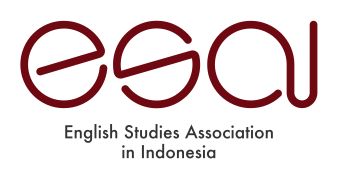STUDENTS’ ATTITUDES TOWARDS LANGUAGES AND MAINTENANCE OF HERITAGE LANGUAGES: A CASE STUDY OF PAPUAN SENIOR HIGH SCHOOL STUDENTS
Abstract
Keywords
Full Text:
PDFReferences
Alsahafi, M. (2019). Language maintenance and heritage language education: The case of a weekend Arabic school in New Zealand. IJALEL 8(2), 21-29. http://dx.doi.org/10.7575/aiac.ijalel.v.8n.2p.21
Altarriba, J. & Heredia, R. R. (2008). An introduction to Bilingualism: Principles and processes. New York: Taylor & Francis Group.
Armon-Lotem, S., Rose, K., & Altman, C. (2021). The development of English as a heritage language: The role of chronological age and age of onset of bilingualism. First Language 4(1), 67-89. DOI: 10.1177/0142723720929810
Berman, R., Lefever, S., & Woźniczka, A. K. (2011). Attitudes towards languages and cultures of young Polish adolescents in Iceland. Ráðstefnurit Netlu – Menntakvika, 1-16.
Blackledge, A. & Creese, A. (2008). Contesting ‘language’ as ‘heritage’: Negotiation of identities in late modernity. Applied Linguistics, 29(4) , 533–554.
Budiyana, Y. E. (2017). Students’ parents’ attitudes toward Chinese heritage language maintenance. Theory and Practice in Language Studies, 7(3), 195-200. DOI: http://dx.doi.org/10.17507/tpls.0703.05
Cho, G. (2000). The role of heritage language in social interactions and relationships: Reflections from a language minority group. Bilingual Research Journal, 24(4), 369-384.
Cho, G. (2015). Perspectives vs. reality of heritage language development: Voices from second-generation Korean-American high school students. Multilingual Education. 30-38.
Darvin, R. & Norton, B. (2016). Investment and language learning in the 21st century. Langage et société 3 (157), 19-38.
Ding, S. L. & Goh, K. L. (2019). The impact of religion on language maintenance and shift. Language in Society 49, 31–59.
doi:10.1017/S0047404519000642
Ehala, M. and Niglas, K. (2006). Language Attitudes of Estonian Secondary School Students. Journal of Language, Identity, and Education, 5(3), 209–227.
Farr, J., Blenkiron, L., Harris, R., & Smith, J.A. (2018). “It’s my language, my culture, and it’s personal!” Migrant mothers’ experience of language use and identity change in their relationship with their children: An interpretative phenomenological analysis. Journal of Family Issues, 39(11), 3029–3054. DOI: 10.1177/0192513X18764542
Huia, A. T. (2015). Exploring goals and motivations of Māori heritage language. SSLLT 5 (4), 609-635. doi: 10.14746/ssllt.2015.5.4.5
King, K. A. (2000). Language ideologies and heritage language education. International Journal of Bilingual Education and Bilingualism, Vol. 3/3. 167-184.
Little, S. (2020). Whose heritage? What inheritance?: conceptualising family language identities. International Journal of Bilingual Education and Bilingualism, 23(2), 198–212 https://doi.org/10.1080/13670050.2017.1348463
Nguyen, T.T. (2018). Bilingual identity of ethnic minority students: insights from Vietnam. International Journal of Bilingual Education and Bilingualism. 1-16.
Norton, B. & Toohey, K. (2011). Identity, language learning, and social change. Language Teaching, 44/4. 412-446.
Polinsky, M. (2015). Heritage languages and their speakers: State of the field, challenges, perspectives for future work, and methodologies. Zeitschrift für Fremdsprachenforschung, 26: 1, S. 7-27.
Russell, B. D. & Kuriscak, L. M. (2015). High school Spanish teachers’ attitudes and practices toward Spanish heritage language learners. Foreign Language Annals, 48(3), 413–433. DOI: 10.1111/flan.12145
Velázquez, I. (2017). Reported literacy, media consumption and social media use as measures of relevance of Spanish as a heritage language. International Journal of Bilingualism 21(1), 21–33. DOI: 10.1177/1367006915596377
DOI: http://dx.doi.org/10.30813/jelc.v12i1.2697
Refbacks
- There are currently no refbacks.



2.jpg)



